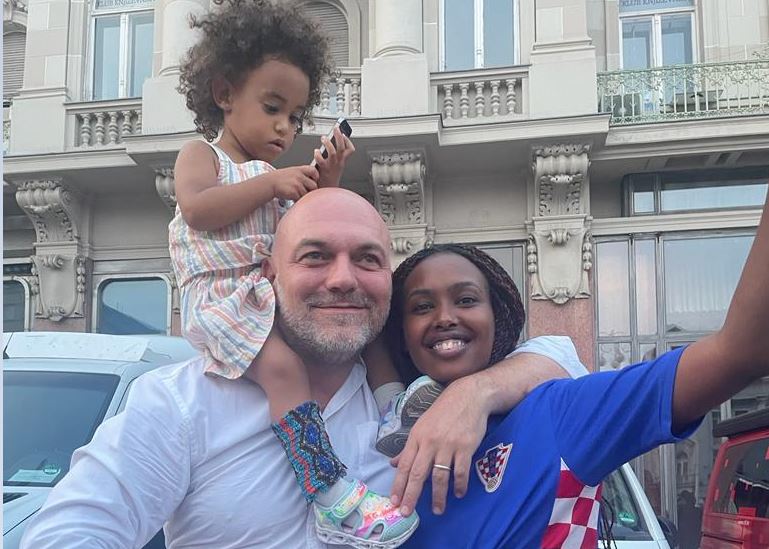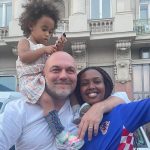September 10, 2023 – Continuing our look at the realities of life of a Croatian-African family now in Zagreb, the joys of bureaucracy and family approval of a partner.
Well son, it’s your decision who you’re going to be with. The only thing that matters to me is that it’s not… and then it starts (depending on the family). Only if she is not Muslim or Orthodox. Or a black woman of any faith. Also, Arab, Chinese, Indian, Latina, Japanese. Hindu-Jewish women are the worst, everyone knows that.
If possible, and it’s not my place to mess around, it would be best if she were Croatian, white and Catholic. From a good family. And that she is not older than you. Or too young. You know that mom wants the best for you. What did she graduate in? That’s how it usually goes when a Croatian son tells his old mother that he has someone, that it’s serious and it’s time for the two of them to get to know each other.
African moms are just as complicated when it comes to their daughters, so you can imagine how Croatian-African relationships might easily go awry. They also ask ‘is he at least ours?’ For them, it more or less concerns the tribe from which the ‘kidnapper’ of their daughters is from. Ours, in the case of my wife’s family, would be Tutsi. By no means Hutu. That would be a sin on the same level as the Hercegovka from Široki Brijeg having quarrelled with a Muslim. Or “our” girl from Vinkovci with a Serb. Ours would also be a Christian, by no means a Hindu or, God forbid, a Muslim. If he is too young, he would not be suitable, the male below must be at least ten years older (I fulfilled that requirement).
In Africa, it’s also important if you have money, because if you don’t, her mom won’t feed you for sure. Most often, even the poor woman does not know how to feed herself and her younger children. But what is super important in Africa is that being ‘ours’ does not necessarily mean that you are black. If you’re white, ‘our’, you’re actually at your best. Especially if you take their daughters to Europe, America…anywhere as far as possible from that misery down there. And misery is not only penury. Down in Africa, husbands still beat their wives like oxen in cabbage. To date, there has not yet been a case of any of these ‘husbands’ being reported for domestic violence. So, only to go to a better life is enough. Even to Croatia.
And so in Africa, in Burundi and Rwanda, I successfully passed the most difficult exam in my life. My wife’s immediate family (about 80 members, note the average number of children per family there is 6) accepted me as if I were theirs (ours). With a larger group (about 200 members of extended family) it was a bit more difficult because I didn’t have a solution for the many ambitions that ranged from finding a job to enabling a sports or music career for everyone who asked. In the end, her mom turned out to be a wonderful person who would feed me even if there was nothing left for herself.
In recent years, we have successfully and stress-free navigated seas full of steam and dried-up beds of financial lakes. There was no difference. But there was a difference, too, when the local politicians, who had been used to it for years, fake friends and hundreds of acquaintances realized that I had turned off the faucet. They will never forgive me for that. They used to call me ‘brother from another mother’, and in the end they almost didn’t ask for DNA testing of our friendship. It certainly didn’t help when I stopped supporting the ruling party too. Maybe I would, but I couldn’t stomach it when I realized what they were actually doing (this refers to Burundi and the ruling CNDD-FDD) with the money I donated on behalf of the company I worked for under the auspices of education, aid to victims or orphans. If you are not with us, you are not ours. And bye.
So we moved from Burundi to Rwanda 3 years ago. On the first flight. And with two suitcases. It was much better in Rwanda, but there we were ambushed by our extended family. And so the three of us, wife, baby and I, moved to Zagreb three months ago. With the nuances of Croatian-African relationships firmly in mind, it was at the airport that I was sure that I had at least made her mom happy. We came.
Although she only met half of the criteria to be ‘ours’, she is Catholic and has a degree in IT, but she is black, much younger and does not come from a family with which the average Croatian would want to be ‘matched’, for me she is still the love of my life. Well, I don’t care what others often think, and less often say, about her. And I was so happy when we got home. It was one of the happiest days of my life. I look at her and the baby… and I hid my tears. Who would have thought then, on June 3, 2023, in the evening at Tuđman, that I was such a Hlebinec.
So it didn’t take long and in Zagreb I soon realized, if the immediate family and the previously described criteria are excluded, what it means to really be ‘ours’. And who are actually ‘ours’.
I explained in the previous text, but I will have to repeat that our Croatian-African relationship is signed and sealed officially. My wife and I are officially married and we have already obtained the Croatian version of the marriage certificate. Our baby Luna got an OIB (personal identification number). So far, we have spent a lot of money to translate the kilo and a half of documents we brought from Rwanda. All those marriage and birth certificates, certificates, and more certificates.
But now, with three months having passed since the time we arrived, my girls still don’t have a place of residence. Consequently, they don’t have health insurance either. And the wife can’t even start working at the well-paid job that awaits her because she can’t do it without that one simple piece of plastic, an ID card. We are waiting, I guess everything should be ready pretty soon. Again. After three months of waiting.
Yesterday, we happened to sit down with an Asian man who runs a temporary employment agency. His workers from Nepal, Bangladesh, India and Pakistan are ‘ours’ here in Zagreb, obviously more than my wife and baby because they don’t wait three months for anyone to get Croatian papers. Clearly, in their case, smiling Franklins from hundred dollar bills are distributed among agencies, intermediaries, fixers, company friends, employers and other interested parties, while the three of us are just one ordinary family that decided to live in the country of this husband and father.
So we are obviously less interesting than all those thousands, tens or hundreds of thousands of workers who came to break their bones for little money. We are not that important. More precisely, so necessary. We are different because we came to stay, to work, to live. That our child can grow up here. Went to kindergarten, school, graduated college one day in Zagreb. At the University of Zagreb. And how we would be treated in Croatian hospitals if we are sick. In order to buy cheese and cream from Kumica on Dolac. To support Hajduk or Dinamo and went to matches. We were even delighted when, after a couple of days in Zagreb, Luna greeted my mother with ‘dobro jutro’ instead of the previous mwaramutse (in Kinyarwanda). Luna really likes watching Šegrt Hlapić. The idea was to understand it in the original language.
I watch every morning how the barbell of sadness (not to mention disappointment) is drawn into my wife’s eyes. Every morning she wakes up and checks her e-mail for hours, until the end of working hours in the offices. She is waiting for information that she has been approved for residence in Zagreb, that she has received an OIB. That she can get her life going. She needs it in order to start working on the job that she only found a few days after we landed in Zagreb. And I know that she is lying to me, that she is suffering inside, because she is in pain since she almost died in Rwanda giving birth to Luna.
And yet, for three months in Zagreb, she has not been able to go to the hospital. And I know she cries after the baby and I fall asleep because she’s afraid something will happen to Luna, and she’ll have to go to the hospital too. Uninsured like this. I know, I know…there’s travel insurance. But those sorts of arrangements expire quickly. And we are not travelling anywhere. We came here to live. And stay. Administrative procedures also require confirmation of the source of income you have. How, if I may ask, is that possible if it’s not possible to work?
Even while we were in Africa, all those years, I read the news from Croatia about how young people were leaving. And that the pronatal policy is a strategic goal of the Republic of Croatia. Almost all political parties in this country are talking about this. They swear by it like my late grandmother Marija swore by God. And she was a serious believer.
Given that I was also reading about all those rigged tenders, subsidies, scams, ‘our people’, I finally decided to solve our problem in our people’s way. I am offering myself and my family (Luna is already Croatian on paper) to any political party in Croatia. We vote for them, plus I can write a few panegyrics on the account of benefactors, anyone who helps us in realizing our basic human rights; the right to a regulated status, to work, education and treatment.
Plus, and this is a benefit that Africans can offer, they will give birth to a few more children (by themselves, without adoption) so that Croatia’s pro-natal policy will gain momentum. They don’t need any of the dignitaries to be best man (our friend Silvijo and his wife Doris will do that). They don’t even need ‘subsidies’ for each subsequent child. That subsidy is love. We are just appealing to the institutions to take a look at our file so that after three months of waiting, my wife will finally be able to work, be insured and simply become ‘one of us’. Because even though it may not be exactly aligned with the criteria of our mothers and grandmothers, the three of us are totally part of it all here in Zagreb. As we will be anywhere else if we are so alien here.
At this moment my wife is shouting something at me from the kitchen…. nothing has come in the mail yet.
Tell me please our dear readers what to suggest to her, where we are going; to Ireland or to Nepal?










